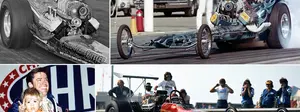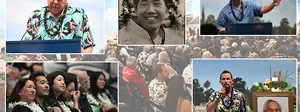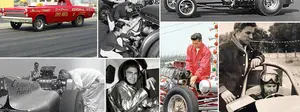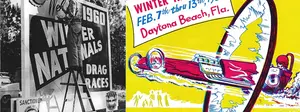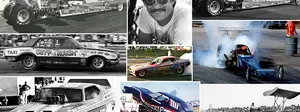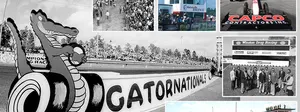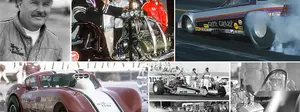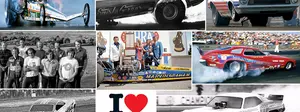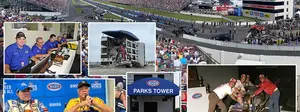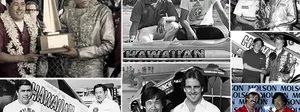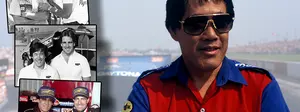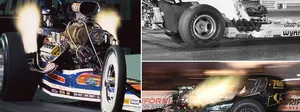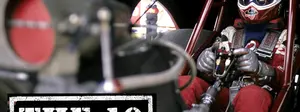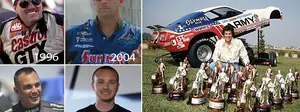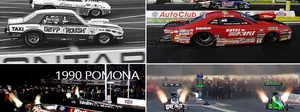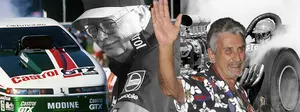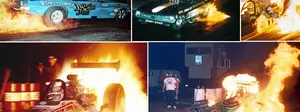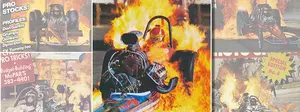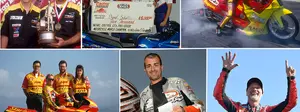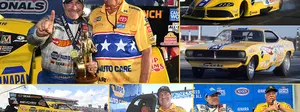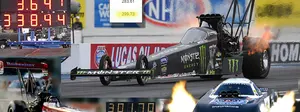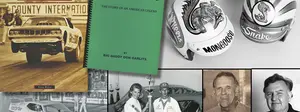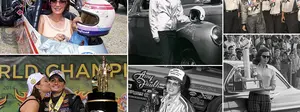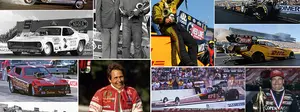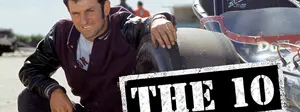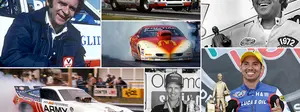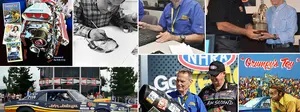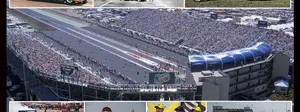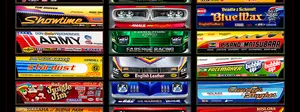The 10: Don Garlits
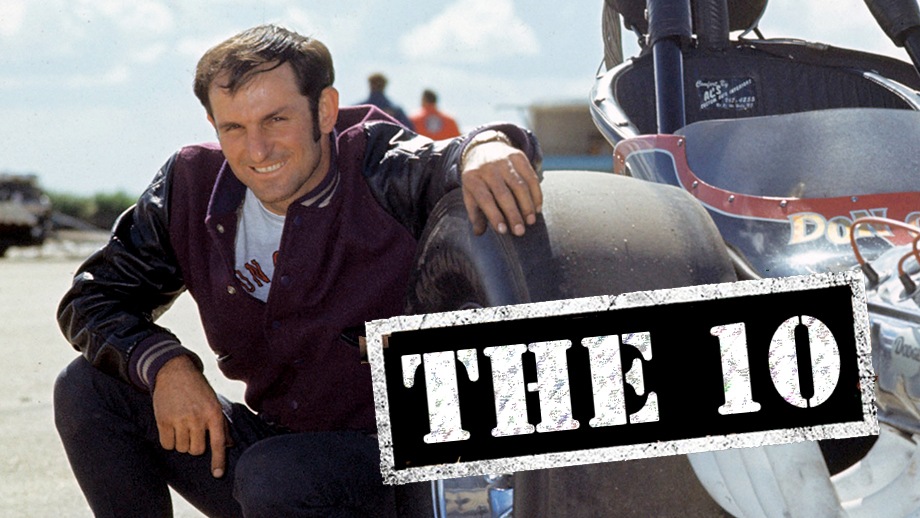

In 2001, as part of its 50th-anniversary celebration, NHRA created a list of the Top 50 Drivers of its first 50 years, with a panel of experts weighing in based on criteria that included on-track success, contributions to the growth of NHRA Drag Racing, technological breakthroughs, innovations, marketing and sponsorships, and fan popularity. Donald Glenn Garlits, also known as “Big Daddy,” was the hands-down No. 1 vote, finishing ahead of John Force by a wide margin.
Garlits, who is the grand marshal for the inaugural Wally Parks NHRA Nostalgia Nationals, checked all of the boxes. To the delight of his legion of fans, Garlits won three NHRA championships and 35 national events, but he forever left his mark on the sport with his innovations, most notably the first successful rear-engined Top Fueler in 1971. Garlits hand-built more than 30 Swamp Rat-branded dragsters, and many of them were hugely successful. He was the first to exceed 200 and 250 mph, and Swamp Rat XXX, the first successful streamlined Top Fuel dragster, took Garlits past the 270-mph barrier and to his third NHRA Top Fuel championship in 1986. In 1987, he took it and the reputation of the sport to Washington, D.C., for the car’s installation at the Smithsonian Institution.
He further contributed to the sport when he opened the Don Garlits Museum of Drag Racing in Ocala, Fla., in 1984, and his return to the sport that same year helped save the Top Fuel class, which was declining in popularity and car count. Over the course of his long career, he “retired” numerous times but always came back. Despite ending his Top Fuel career in 2003, he tackled his next innovative challenge, an assault on the 200-mph barrier with an electric dragster. Even at age 92, Garlits remains a dynamic and creative personality in the sport.
Below, we present 10 of Garlits’ most memorable racing moments.
1964: First NHRA 200-mph run

Over the years, there’s been much debate about who made the first 200-mph run: Don Garlits, Connie Kalitta, or Chris “the Greek” Karamesines. Garlits has long maintained that “We had the power to go 200 mph as far back as 1957, but not the tires.”
In April of 1960, Karamesines was reported to have made a 204.54-mph run at the track in Alton, Ill., a facility with a reputation for unreliable times. The encyclopedic Top Fuel Handbook reports that there were 17 200-mph speeds given out at 10 different tracks, including Alton, from 1960 to 1963, and almost all are emphatically dismissed due to the inaccuracy of the early timing systems or blamed on greedy promoters. Somehow, the Karamesines time had some validity, but not widespread.
When the “200-mph tire” finally emerged, the race was on, and, once again, Garlits won when he ran 201.34 at Island Dragway in Great Meadows, N.J., at the NHRA World Championship Series event Aug. 1 under NHRA supervision. A month later at the NHRA U.S. Nationals on Labor Day weekend, Kalitta clocked a 200-mph run during Friday’s qualifying and claimed to be the first because of alleged flaws in the Alton and Great Meadows timing systems and the lack of shutoff room at Great Meadows, claims that Garlits refuted.
In a December 2020 interview with NHRA’s Phil Burgess, Garlits clarified his stand on the situation by saying, “I set the first 200-mph NHRA national record but, as far as the first 200 speed, that belongs to ‘the Greek.’ ”
1965: March Meet domination

Of all the races that Don Garlits won over the years, none were as impressive as his two-day total domination of the fabled Bakersfield March Meet, also known as the U.S. Fuel and Gas Championships, in 1965. The car that Garlits drove that weekend, Swamp Rat VI-B, already had a winning pedigree with drag racing’s first 200-mph run, a victory at the U.S. Nationals, and top speed of the meet at the 1965 Winternationals. It was also the car that Garlits drove during the 1964 NHRA tour of England in late 1964.
The 1965 Bakersfield event featured drag racing’s first 64-car field on Saturday, and Garlits won all six rounds of eliminations. The victory gave Garlits the right to sit out Sunday’s 32-car show and would meet the winner of that program. But when Garlits’ teammate, Marvin Schwartz, developed tuning problems, Garlits jumped into the cockpit for Sunday’s first round to diagnose the situation. Garlits won the round and decided to stay in the car and ended up winning the Low 32 eliminations for the right to face Saturday’s winner, which was, of course, Garlits.
Because one driver could not drive two cars at the same time, Schwartz got back into his car with Garlits winning the final to claim the overall March Meet title. The victory completed his quest to win all of the “Big Three” events of that era: the Nationals in Indy, the Winternationals, and the March Meet.
[Read more from the pages of National Dragster: Garlits dominates "Smokersfield" March Meet]
1967: The Comeback Nationals

Don Garlits was in one of the worst droughts of his career in late 1967. He had failed to qualify at both the Winternationals and Springnationals, struggling with a car that was too old and too heavy. He hadn’t even run in the sixes as many of his peers had when he came to the U.S. Nationals that year with a new car, Swamp Rat XI, and vowed not to shave until he’d run in the sixes.
Garlits qualified just 23rd in the 32-car field with a 7.16 (low e.t. was 6.76) while struggling with his Goodyear tires and borrowed a pair of M&H slicks from No. 4 qualifier James Warren, who also advised him on a good clutch setup for the tires. Garlits beat Mike Sniveley, Mike Sorokin, Jerry Dawson, and Tom McEwen, running as quick as 7.03, to put him into an ironic final-round battle with heavily favored Warren.
Every round, even before the final, Garlits had offered to return the slicks to Warren, but Warren declined, confident in his ability to outperform Garlits. But “Big Daddy” zapped Warren in the final with a stunning 6.77 to Warren’s engine-blowing 6.95 and celebrated his second Indy win on the starting line by shaving while surrounded by scores of his fans.
[Insider: Don Garlits, Bob Taaffe, and the 72-hour car build that led to drag racing lore]
1970: Lions explosion

One of Don Garlits’ life-changing moments came March 8, 1970, at Southern California’s hallowed track, Lions Drag Strip, where Garlits lost half of his right foot when the transmission exploded in the ironically numbered Swamp Rat 13 on the starting line in the final of the AHRA Grand American season opener.
Garlits had begun experimenting with Leonard Abbott’s two-speed transmission in late 1969 and quickly built his own out of parts from a Chrysler 727 Torqueflite, dubbing it the Garlitsdrive. The transmission worked well and won him several races at year’s end but was not put into the car in 1970 until that fateful final round at Lions after Garlits suspected he’d damaged his conventional transmission after breaking the rear end in the semifinals.
Against Richard Tharp in the final, the transmission’s sprag rolled over the drum and the transmission revved to somewhere around 20,000 rpm before coming apart in a blaze of shrapnel. The sport had just lost John Mulligan to burns the previous year after his clutch exploded as engines, clutches, and bellhousings, pushed to and beyond their limits, began to give out with an alarming frequency.
While he was recuperating in the hospital, Garlits began scheming about his soon-to-be revolutionary rear-engine dragster, Swamp Rat 14, which would change the face of the class forever.
1971: First rear-engined win

Don Garlits was not the first to build a rear-engine Top Fuel dragster, but he was the first to build one that worked, and it revolutionized the class. This design places the driver out of harm’s way and has saved many competitors from countless engine and clutch explosions over the years.
When Garlits debuted the car at a Lions Drag Strip Top Fuel event two weeks prior to the 1971 Winternationals, the initial reactions were dismissive. No one wanted to make qualifying runs alongside him, and Lions manager C.J. Hart warned that if the car crossed any barrier lines it would have to be put back in the trailer. But after having made countless testing runs in Florida to get the steering geometry correct, Garlits ran straight and true for a runner-up finish and repeated the feat on the next weekend at Orange County Int’l Raceway in Southern California.
Garlits qualified 10th in the 32-car Winternationals field with a 6.84 and then mowed his way to victory with times in the low 6.70s. Five weeks later, at Bakersfield’s fabled March Meet, Garlits silenced the last of any doubters when he again conquered the Top Fuel field. By this time, the transition to rear-engine configurations was on, and the last NHRA national event victory by a front-engine Top Fueler came in the summer of 1972.
[Insider: Front to back: The rear-engine transition, Part 2]
1972: First Gatornationals victory

Florida’s most famous drag racer won its most prestigious drag race, the Gatornationals, four times in his career, beginning with his conquest of the field at the 1972 event. By that point in his 10-year Top Fuel career, Don Garlits had won virtually every NHRA national event on the schedule, except the one in his own backyard, which had debuted two years earlier.
The third time was the charm for “Big Daddy,” and he won the event in true dominating Garlits fashion. Garlits qualified No. 1 with a 6.23, well ahead of Clayton Harris in Jack McKay’s national record-holding “New Dimension” fueler (6.31) and Tom “the Mongoose” McEwen (6.32). In the semifinals against McEwen, Garlits ran 6.15, the quickest time in class history, then squared off with Harris in the final.
Following their respective burnouts, the engine in Garlits’ Swamp Rat 16 was puffing smoke out of one header, leading some, including perhaps Harris, to think Garlits’ engine was wounded. But, no, Garlits earlier had poured four tablespoons of STP into one of the headers as a decoy, then ripped to a 6.17 at 243.90 (the fastest speed ever) in the final to beat the 6.24, 238.09 of Harris in what was then the quickest and fastest side-by-side race in history.
[From the pages of National Dragster: Garlits takes first Gators crown]
1975: The run that stopped time

Don Garlits won his first of three NHRA Top Fuel world championships by winning the 1975 World Finals at Ontario Motor Speedway, but it was one run of many spectacular passes he made at the season finale that is forever etched in the record books.
During Saturday qualifying, Garlits’ Swamp Rat 22 roared to a stunning 5.637-second pass at 250.69 mph, the first 250-mph pass in class history. Garlits backed up his 5.63 run with a 5.65 to make it an official NHRA national record, which was mind-boggling because it was more than a tenth and a half quicker than his own NHRA Top Fuel record of 5.784 seconds, set two years earlier at the same event.
In a 2005 interview with NHRA National Dragster, Garlits revealed that the power for his 5.63 run came from a new set of high-compression pistons and a trick new camshaft that he kept under wraps for years after. The run itself was not bettered for more than five years, until Jeb Allen ran 5.61 at the 1981 Gatornationals, but he was not able to back it up for the national record.
The record, however, would not be bettered for more than six years and nine months — from Oct. 11, 1975, until July 17, 1982 — when Mark Oswald broke it with a backed-up 5.62 at the Summernationals.
[Insider: 2,470 days later ...]
1984: “Big Daddy” is back!

Don Garlits ran infrequently with the NHRA in the early 1980s, struggling with his Swamp Rat 25 ground-effects car in 1980 and sitting out 1981 in protest of rules change. Other than his appearance at the 1982 Gatornationals, Garlits didn’t run an NHRA event again until 1984, and even then, the 52-year-old legend seemed a shadow of himself. The three-year-old Swamp Rat 26 lost three straight rounds to Shirley Muldowney in a preseason match race, and he qualified just 14th and lost in round two at the Gatornationals.
Then Garlits’ old pal and partner, Art Malone, came calling with the offer of new parts for a run at another U.S. Nationals title, a race that Garlits had not won since 1978. Garlits coaxed crew chief Herb Parks out of retirement, and despite an aging car and a team of “dinosaurs” (Garlits’ word), they won the race, completing a storybook comeback straight out of Hollywood, Calif. Spurred on by Muldowney — recovering from her nasty Montreal wreck — who implored him to “Go up there and kick their butts,”
Garlits qualified third, then, to the roar of the crowd, blasted past Shannon Stuart, Howard Haight, and Larry Minor to meet up with longtime rival Connie Kalitta in the final. Kalitta, then still a spry 47, began to haze the tires at the 200-foot mark, and Garlits pulled away for his sixth career U.S. Nationals win, 5.52 to 5.69.
[From the pages of National Dragster: Garlits' Indy comeback nets big win]
1986: Over backwards at E-Town

Don Garlits’ 1986 championship was not without challenges as “Big Daddy” wrecked Swamp Rat XXX in an over-backwards “blowover” wheelstand at the Summernationals that year.
One run after setting the national record in qualifying with a 5.343, the car flipped over backward at halftrack. A decreased fuel load from a prolonged hold on the starting line to fix a leaky line made the front end light, and when it went up, the air caught under the big nose, and Garlits was a passenger for a frightening tumble. The car stood straight up, twirled a half-turn, and miraculously landed back on all fours in a cloud of smoke as its momentum carried the car almost to the finish line with the rear tires still churning forward. When the car hooked, it headed back uptrack a few hundred feet before Garlits cut the power.
Garlits was unhurt, the car only was surprisingly mildly bent. Garlits repaired the car, won three more races in 1986, and ran it through mid-1987 before it ended up in the Smithsonian, then brought out a similar car, Swamp Rat 31. Incredibly, that car, too, went over backwards, this time at the finish line at an AHRA event in Spokane, Wash., on Aug. 21.
Garlits suffered two broken ribs and injured his back and didn’t drive a fuel dragster again until 1992.
[Read more: Garlits 1986 interview with National Dragster]
2001: “Big Daddy” gets his 300-mph pass

After a five-year absence, Don Garlits debuted his monowing-equipped Swamp Rat 32 in 1992 in hopes of a four-second, 300-mph pass, but he suffered a detached retina under heavy deceleration after just a few races and retired with best performances of 5.07 and 287 mph.
Almost a decade later, Garlits planned a comeback for the 2001 U.S. Nationals in hopes of getting his first four-second and 300-mph passes, but his Swamp Rat 34 was out of rules compliance and could not pass tech. Gary Clapshaw, runner-up at the U.S. Nationals the year before, volunteered his car to Garlits. Clapshaw’s dragster had previously gone as quick as 4.68 and had run well over 300 mph on numerous occasions, so the car was definitely there, and within days Matco Tools stepped in and provided additional funding.
After four trouble-plagued qualifying runs, Garlits finally blasted to a 4.720 at 303.37 mph to not only accomplish both ends of the performance goals but also secure a spot in the field, his first since the Brainerd event in 1987, more than 14 years earlier. Although Garlits was ousted in round one by Mike Dunn, he’d already accomplished his main goals. Garlits returned to Indy in 2002 with retrofitted Swamp Rat 34 and ran a career-best 318.54 mph and followed with a pass of 323.04 mph at his home-state Gatornationals in 2003.
At the insistence of his late wife, Pat, he retired from Top Fuel competition later that year.
[Insider: The Clapshaw Effect: How Don Garlits finally made his first 300-mph pass]
As I mentioned in the tribute to our good pal and retired National Dragster colleague John Jodauga, this was his final freelance assignment for us, which was underway when he took ill. We were able to get his laptop from his sister and find portions here and there that he completed, which allowed us to give him his final NHRA byline. He hadn't completed much, and I ended up writing the vast majority of it, but his spirit was there.
I rather like the format, which I will reprise later this year when I do the same for Don Prudhomme, who will be the grand marshal at the Bakersfield event, and may also incorporate this style in other Insider columns this season, picking top great moments from the careers of heroes like Shirley Mudlwoney, Raymond Beadle, Kenny Bernstein, Tom Mcewen, and others. I think it's a great way to salute these icons and put my own little stamp on them. The moments are purely subjective, but, hey, it's my column, right? Your mileage may differ, and I'd certainly love to read your opinions.
Phil Burgess can be reached at pburgess@nhra.com
Hundreds of more articles like this can be found in the DRAGSTER INSIDER COLUMN ARCHIVE
Or try the Random Dragster Insider story generator


